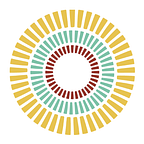DENMARK: Empower Our Most Vulnerable to Build Back Better
Disability rights advocate Sif Holst on the importance of nurturing everyone’s potential as we build strategies to recover from the pandemic.
“If we truly are to build back better after the pandemic, we must activate our resources to empower each other and develop our skills.”
by Sif Holst on World Pulse
The pandemic has affected us all, striking hard at some of the most vulnerable communities and individuals. “Now is the time to build back better,” is the message from world leaders. Though I agree, I fear that these same world leaders will too soon forget vulnerable groups again.
The groups society undervalues — women leaders and caretakers, women from different ethnic and social backgrounds, women with disabilities — hold the potential to see new solutions, offering another way of doing things. We witness this on World Pulse, in this community of strong women from around the world with diverse lived experiences. We see how much we all have to offer.
I am a woman with a disability, a rare connective tissue disorder called Ehlers-Danlos Syndrome. As the vice-chair of Disabled People’s Organisations Denmark and a candidate for the UN Committee on the Rights of Persons with Disabilities, I see how society treats women with disabilities as a group with nothing to contribute. If we are even considered for a job, it is usually an unskilled, low-income job. When society sees you as worthless and denies you opportunities, you often become even more vulnerable and dependent on others.
Why do we keep undermining our society this way? How can we achieve our potential as a society if we discard up to half of our population as less-than? If we see disability as a sign of weakness, we miss the tremendous power and strength of people with disabilities. We’ve overcome barrier after barrier, developing skills, and cultivating resilience. How can we achieve our potential if those around us don’t believe in us, especially when we doubt ourselves?
Across the world, too many people with disabilities have experienced a loss of income and job stability. In the United States, officials estimate that close to 1 million people with disabilities lost their jobs during the first months of the pandemic. From March to April 2020, the number of employed working-age people with disabilities fell by 20%, while the number of employed working-age people without disabilities decreased by 14%. The pandemic has interrupted support services such as personal assistance, sign language interpretation, and psychosocial support.
COVID-19 also spurred a substantial increase in domestic violence against women. France has registered an increase of 30% on reports of domestic violence, and we know that women with disabilities are up to 10 times more likely to experience sexual violence than women without disabilities. The pandemic affected many health and rehabilitation services, limiting women’s access to help and treatment.
We need to empower each other, not tear each other down. We need to see each other’s potential and nurture it with passion. We must insist on believing, supporting, and nurturing each other.
One way of empowering is to listen to each other and to help each other access resources, such as training and mentoring. The “old boys network” has long been the secret weapon of many men. Women should create and support each other in their own more diverse networks. Another important issue is to show women from diverse backgrounds as role models, experts, and leaders. Insist on “no woman, no panel” and “no diversity, no panel” policies when setting the scene for a discussion or event.
The Valuable 500 is a global movement putting disability on the business agenda. The movement argues that more than 1.3 billion people are living with a disability and if you consider our connections, we have a potential market of $8 trillion. These companies want to employ persons with disabilities because they can learn from employees with disabilities, innovating, re-designing, and strengthening their communication with accessible tools and broader representation. It is a matter of common sense, and it’s good for business.
The same holds true for so many other marginalized groups in our society. If we truly are to build back better after the pandemic, we must activate our resources to empower each other and develop our skills. We need the opportunity to prove our potential.
We all have those dark days full of doubt and loneliness, where we stop believing. If we are to build back better, we must build a community where we know that there is someone who believes in us — someone who has been in the same darkness and yet has found a path forward, someone who is ready to stand with us.
I believe in empowering with passion — individuals and, through them, society. And I believe that we can only do this together. This is how we build back better following the pandemic.
STORY AWARDS This story was published as part of World Pulse’s Story Awards program. We believe every woman has a story to share, and that the world will be a better place when women are heard. Share your story with us, and you could receive added visibility, or even be our next Featured Storyteller! .
Originally published at https://www.worldpulse.com on August 4, 2021.
